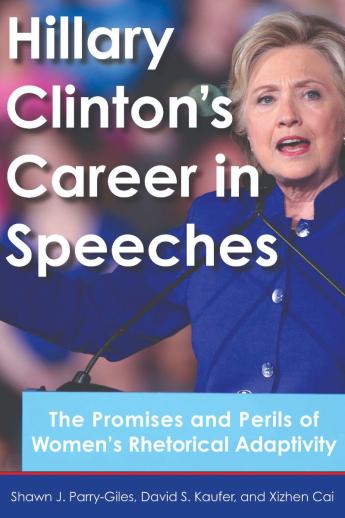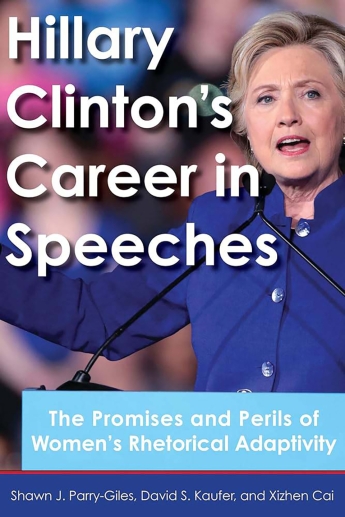Shawn J. Parry-Giles

Chair, Communication
Professor, Communication
spg@umd.edu
2126 Skinner Building
Get Directions
Education
Ph.D., , Indiana University
Research Expertise
Gender
Political Communication
Rhetoric
Dr. Shawn J. Parry-Giles is Professor and Chair in the Department of Communication at UMD.
She also serves as the Director of the Rosenker Center for Political Communication & Civic
Leadership. Dr. Parry-Giles studies rhetoric and politics with a focus on the relationship between
power and resistance in historical and contemporary politics. She has co-authored and co-edited
eight books and a diversity of journal articles on presidential rhetoric, women and politics, media
and politics, and political identity and feminism. She teaches classes in political communication,
presidential rhetoric, democratic deliberation, and academic writing.
As Director of the Rosenker Center, Dr. Parry-Giles co-edits two public and digital humanities
projects designed to promote civic education through open-access websites that exemplify the
role of public oratory in local, national, and global politics. Each website features a repository of
historical public speeches and teaching resources that contextualize the rhetorical contributions
of community activists and political leaders. The first is an academic journal entitled, the Voices
of Democracy: The U.S. Oratory Project (with Drs. J. Michael Hogan and Skye de Saint
Felix)—a project initially funded by the National Endowment for the Humanities. The second is
the Recovering Democracy Archives: Speech Recovery Project (with Dr. Skye de Saint
Felix), which recovers lesser-known speeches from archives of those advancing social justice
aims. This project was funded by the Waterhouse Family Institute of Villanova University.
Dr. Parry-Giles also helps mentor students in the principles of democratic deliberation to
organize public dialogues around pressing political issues. Through the Rosenker Center she also
aims to build community partnerships with non-profit political groups working locally to
advance student civic engagement.
Dr. Parry-Giles also co-edits (with Dr. Leroy Dorsey) the book series—The Rhetoric of Power
and Protest—with Michigan State University Press.
Dr. Parry-Giles’s books include:
- Hillary Clinton’s Life in Speeches: The Promises and Perils of Women’s Rhetorical Adaptivity with Michigan State University Press, 2023 (with David S. Kaufer and Xizhen Cai).
- Memories of Lincoln and the Splintering of American Political Thought with Penn State University Press, 2017 (with David S. Kaufer).
- Hillary Clinton in the News: Gender and Authenticity in American Politics, with the University of Illinois Press, 2014 (recipient of the Marie Hochmuth Nichols Award).
- The Prime-Time Presidency: The West Wing and U.S. Nationalism with the University of Illinois Press, 2006 (with Trevor Parry-Giles).
- Handbook of Rhetoric and Public Address, ed. vol., 2010 (with J. Michael Hogan).
- Public Address and Moral Judgment: Critical Studies in Ethical Tensions, ed. vol., 2009 (with Trevor Parry-Giles).
- The Rhetorical Presidency, Propaganda, and the Cold War, 1945-1955 with Praeger Press, 2002 (named a Choice Outstanding Academic Title).
- Constructing Clinton: Hyperreality and Presidential Image-Making in Postmodern Politics with Peter Lang Press, 2002 (with Trevor Parry-Giles)
Dr. Parry-Giles’s current research projects address the debate over the Exoduster movement in
the post-Reconstruction era that marked a mass migration of freed enslaved people out of the
South to states like Kansas and Missouri. A second one compares the speeches that Frederick
Douglass and Elizabeth Cady Stanton gave in 1848 on abolition and women’s rights respectively
in the context of the 1848 Revolutions in Europe.
Dr. Parry-Giles has published articles in such outlets as the Associated Press, Daily
Kos, Huffington Post, Newsweek, Salon, and U.S. News and World Report.
Publications
Hillary Clinton's Career in Speeches
The Promises and Perils of Women's Rhetorical Adaptivity
Author/Lead: Shawn J. Parry-GilesNon-ARHU Contributor(s): David S. Kaufer (Mellon Distinguished Professor Emeritus, Carnegie Mellon University), Xizhen Cia (Assistant Professor, Williams College)
"In examining Hillary Clinton’s rhetoric, the authors find a full-bodied politician, not the caricature so often offered up by the media. Using highly novel analytical procedures, the authors point up Clinton’s complexity and dynamism and juxtapose them with the very real prejudices women still face in U.S. politics. This book will rankle the reader. And it should."
—Roderick P. Hart, author of American Eloquence: Language and Leadership in the Twentieth Century
Women candidates are under more pressure to communicate competence and likability than men. When women balance these rhetorical pressures, charges of inauthenticity creep in, suggesting the structural and strategic anti-woman backlash at play in presidential politics. Hillary Clinton demonstrated considerable ability to adapt her rhetoric across roles, contexts, genres, and audiences. Comparisons between Clinton’s campaign speeches and those of her presidential opponents (Barack Obama, Bernie Sanders, and Donald Trump) show that her rhetorical range exceeded theirs. Comparisons with Democratic women candidates of 2020 suggest they too exhibited a rhetorical range and faced a backlash similar to Clinton. Hillary Clinton’s Career in Speeches combines statistical text-mining methods with close reading to analyze the rhetorical highs and lows of one of the most successful political women in U.S. history. Drawing on Clinton’s oratory across governing and campaigning, the authors debunk the stereotype that she was a wooden and insufferably wonkish speaker. They marshal evidence for the argument that the sexist tactics in American politics function to turn women’s rhetorical strengths into political liabilities.
Hillary Clinton’s Career in Speeches: The Promises and Perils of Women’s Rhetorical Adaptivity
"Hillary Clinton’s Career in Speeches" examines how women candidates, like Clinton, navigate the dual pressures of proving competence and likability in presidential politics.
Author/Lead: Shawn J. Parry-Giles
Women candidates are under more pressure to communicate competence and likability than men. And when women balance these rhetorical pressures, charges of inauthenticity creep in, suggesting the structural and strategic anti-woman backlash at play in presidential politics. Hillary Clinton demonstrated considerable ability to adapt her rhetoric across roles, contexts, genres, and audiences. Comparisons between Clinton’s campaign speeches and those of her presidential opponents (Barack Obama, Bernie Sanders, and Donald Trump) show that her rhetorical range exceeded theirs. And comparisons with Democratic women candidates of 2020 suggest they too exhibited a rhetorical range and faced a backlash similar to Clinton. Hillary Clinton’s Career in Speeches combines statistical text-mining methods with close reading to analyze the rhetorical highs and lows of one of the most successful political women in U.S. history. Drawing on Clinton’s oratory across governing and campaigning, the authors debunk the stereotype that she was a wooden and insufferably wonkish speaker. They marshal evidence for the argument that the sexist tactics in American politics function to turn women’s rhetorical strengths into political liabilities.
Fix the "Cancel Culture" Mentality
Parry-Giles publishes chapter on "cancel culture" in new volume.
Author/Lead: Shawn J. Parry-GilesNon-ARHU Contributor(s): edited by Roderick P. Hart
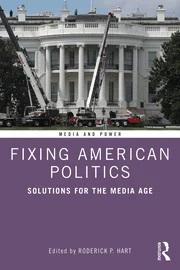
Fixing American Politics: Solutions for the Media Age brings together original chapters from 34 noted scholars from two disciplines – political science and communication – asked to identify the most pressing problems facing the American people and how they can be solved. Authors address the questions succinctly and directly, with their favored solutions featured in chapter titles that exhort and inspire.
The book gives the reader much to think about and debate. Should news outlets be funded with public money rather than by private enterprise? Are the new social media a boon or a bane to political elections? Is the American past dead, or is it living once again? Do churchgoers and environmentalists have anything to discuss? Is the FCC doing its job? Can political ads be made less toxic? Should Fox News be "cancelled?" Should cancel cultures be cancelled? Can we become more civil to one another and, if so, how? Fixing American Politics poses all the best questions … and offers some concrete answers as well. This book is perfect for students, citizens, the media, and anyone concerned with contemporary challenges to civic life and discourse today.
The Veeps Audition—Campaign 2020: Disciplining Kamala Harris
Essay spotlights some of the ways that the 2020 presidential campaign reified the sexism and racism baked into American politics.
Author/Lead: Shawn J. Parry-Giles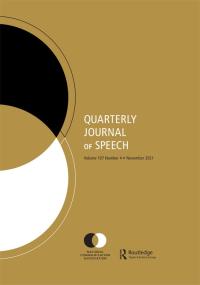
This essay spotlights some of the ways that the 2020 presidential campaign reified the sexism and racism baked into American politics. To demonstrate her suitability as Joe Biden’s running mate, vice presidential candidate Kamala Harris had to downplay her skill as a prosecutor with political intellect and present herself more as a doting and submissive partner picked out of a group of women vying for Biden’s attention. Such expressions of loyalty helped complete the rhetorical disciplining of Kamala Harris as a suitable vice-presidential pick.
Read More about The Veeps Audition—Campaign 2020: Disciplining Kamala Harris
Memories of Lincoln and the Splintering of American Political Thought
This study employs rhetorical and corpus research methods to assess more than five hundred reminiscences of Abraham Lincoln.
Author/Lead: Shawn J. Parry-GilesNon-ARHU Contributor(s): David S. Kaufer
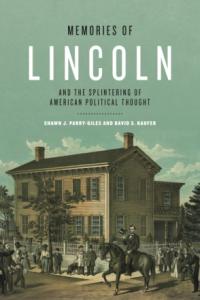
In the aftermath of the Civil War, Republicans and Democrats who advocated conflicting visions of American citizenship could agree on one thing: the rhetorical power of Abraham Lincoln’s life. This volume examines the debates over his legacy and their impact on America’s future.
In the thirty-five years following Lincoln’s assassination, acquaintances of Lincoln published their memories of him in newspapers, biographies, and edited collections in order to gain fame, promote partisan aims, champion his hardscrabble past and exalted rise, and define his legacy. Shawn Parry-Giles and David Kaufer explore how style, class, and character affected these reminiscences. They also analyze the ways people used these writings to reinforce their beliefs about citizenship and presidential leadership in the United States, with specific attention to the fissure between republicanism and democracy that still exists today. Their study employs rhetorical and corpus research methods to assess more than five hundred reminiscences.
A novel look at how memories of Lincoln became an important form of political rhetoric, this book sheds light on how divergent schools of U.S. political thought came to recruit Lincoln as their standard-bearer.
Read More about Memories of Lincoln and the Splintering of American Political Thought
Hillary Clinton in the News: Gender and Authenticity in American Politics
How the media helped construct political gender norms—and critiqued Hillary Clinton for violating them.
Author/Lead: Shawn J. Parry-GilesAward Organization:
Marie Hochmuth Nichols Award, Public Address Division, National Communication Association (NCA), 2015
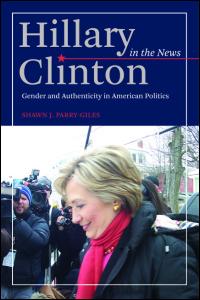
The charge of inauthenticity has trailed Hillary Clinton from the moment she entered the national spotlight and stood in front of television cameras. Hillary Clinton in the News: Gender and Authenticity in American Politics shows how the U.S. media created their own news frames of Clinton's political authenticity and image-making, from her participation in Bill Clinton's 1992 presidential campaign through her own 2008 presidential bid.
Using theories of nationalism, feminism, and authenticity, Parry-Giles tracks the evolving ways the major networks and cable news programs framed Clinton's image as she assumed roles ranging from surrogate campaigner, legislative advocate, and financial investor to international emissary, scorned wife, and political candidate. This study magnifies how the coverage that preceded Clinton's entry into electoral politics was grounded in her earliest presence in the national spotlight, and in long-standing nationalistic beliefs about the boundaries of authentic womanhood and first lady comportment. Once Clinton dared to cross those gender boundaries and vie for office in her own right, the news exuded a rhetoric of sexual violence. These portrayals served as a warning to other women who dared to enter the political arena and violate the protocols of authentic womanhood.
Read More about Hillary Clinton in the News: Gender and Authenticity in American Politics
The Handbook of Rhetoric and Public Address
A state-of-the-art companion to the field that showcases both the historical traditions and the future possibilities for public address scholarship in the twenty-first century.
Author/Lead: Shawn J. Parry-GilesNon-ARHU Contributor(s): J. Michael Hogan
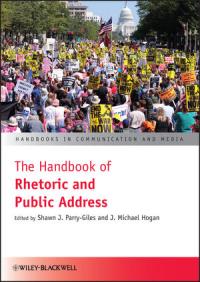
The Handbook of Rhetoric and Public Address is a state-of-the-art companion to the field that showcases both the historical traditions and the future possibilities for public address scholarship in the twenty-first century.
- Focuses on public address as both a subject matter and a critical perspective
- Mindful of the connections between the study of public address and the history of ideas
- Provides an historical overview of public address research and pedagogy, as well as a reassessment of contemporary public address scholarship by those most engaged in its practice
- Includes in-depth discussions of basic issues and controversies public address scholarship
- Explores the relationship between the study of public address and contemporary issues of civic engagement and democratic citizenship
- Reflects the diversity of views among public address scholars, advancing on-going discussions and debates over the goals and character of rhetorical scholarship
Public Address and Moral Judgment: Critical Studies in Ethical Tensions
The essays in Public Address and Moral Judgment consider the powerful role of public discourse in the constitution of a moral code for the American people.
Author/Lead: Shawn J. Parry-Giles, Trevor Parry-GilesAward Organization:
Best Edited Volume Award, Communication Ethics Division, National Communication Association, 2010.
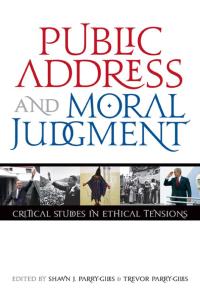
Public Address and Moral Judgment offers a critical look at the ways in which public address can enact moral codes, articulate moral judgments, and manifest ethical tensions. Each chapter carefully examines specific examples of public address for their moral dimensions, exploring how public address functions to articulate and express the ethical tensions of its time and context. The contributors highlight important and often different ways that public address works to expose problematics in ethical tensions—problematics of language and imagery, metaphor and character, genre and definition. The authors are also mindful of the tenuous relationship that exists between rhetoric and morality, between situated public address and a society's ethical foundations.
The essays in Public Address and Moral Judgment, on topics ranging from WWII propaganda to the civil rights rhetoric of President George H. W. Bush to the photographs from the Abu Ghraib prison, consider the powerful role of public discourse in the constitution of a moral code for the American people.
Read More about Public Address and Moral Judgment: Critical Studies in Ethical Tensions
The Prime-Time Presidency: The West Wing and U.S. Nationalism
The Prime-time Presidency presents a detailed critique of The West Wing rooted in presidential history, an appreciation of television's power as a source of political meaning, and television's contribution to the articulation of U.S. national identity.
Author/Lead: Trevor Parry-Giles, Shawn J. Parry-Giles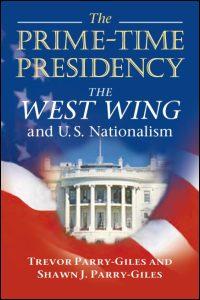
Contrasting strong women and multiculturalism with portrayals of a heroic white male leading the nation into battle, The Prime-Time Presidency explores the NBC drama The West Wing, paying particular attention to its role in promoting cultural meaning about the presidency and U.S. nationalism. Based in a careful, detailed analysis of the "first term" of The West Wing's President Josiah Bartlet, this criticism highlights the ways the text negotiates powerful tensions and complex ambiguities at the base of U.S. national identity--particularly the role of gender, race, and militarism in the construction of U.S. nationalism. Unlike scattered and disparate collections of essays, Trevor Parry-Giles and Shawn J. Parry-Giles offer a sustained, ideologically driven criticism of The West Wing. The Prime-time Presidency presents a detailed critique of the program rooted in presidential history, an appreciation of television's power as a source of political meaning, and television's contribution to the articulation of U.S. national identity.
Read More about The Prime-Time Presidency: The West Wing and U.S. Nationalism
Constructing Clinton: Hyperreality and Presidential Image-Making in Postmodern Politics
Constructing Clinton focuses on the image of Bill Clinton as it was defined by and trapped in the hyperreality so characteristic of contemporary presidential politics.
Author/Lead: Shawn J. Parry-Giles, Trevor Parry-GilesAward Organization:
Everett Lee Hunt Award for Outstanding Scholarship, Eastern Communication Association, 2003.
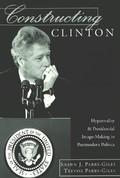
Bill Clinton is the embodiment and epitome of American politics in the postmodern, mediated age. Clinton’s able marshaling of images, which allowed him to retain popularity and position when faced with compelling obstacles, marks him as the preeminent figure in a fluid and fluctuating era of image-politics. Constructing Clinton: Hyperreality & Presidential Image-Making in Postmodern Politics pays particular attention to the collection of disparate, sometimes connected, often random images that create a site of political meaning we know as «Bill Clinton, former president of the United States.» Through analyses of unique image texts – including The Man from Hope, The War Room, Primary Colors, MTV’s Biorhythms, and PBS’ The American President – Constructing Clinton focuses on the image of Bill Clinton as it was defined by and trapped in the hyperreality so characteristic of contemporary presidential politics.
The Rhetorical Presidency, Propaganda, and the Cold War, 1945-1955
"A well-researched, carefully conceived book of interest to students of the U.S. propaganda apparatus and students of presidential rhetoric and communications strategies."--Journal of American History
Author/Lead: Shawn J. Parry-GilesAward Organization:
Choice, Outstanding Academic Title, 2002
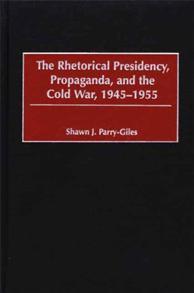
Both Truman and Eisenhower combined bully pulpit activity with presidentially directed messages voiced by surrogates whose words were as orchestrated by the administration as those delivered by the presidents themselves. A Review of the private strategizing sessions concerning propaganda activity and the actual propaganda disseminated by the Truman and Eisenhower administrations reveals how they both militarized propaganda operations, allowing the president of the United States to serve as the commander-in-chief of propaganda activity. As the presidents minimized congressional control over propaganda operations, they institutionalized propaganda as a presidential tool, expanded the means by which they and their successors could perform the rhetorical presidency, and increased presidential power over the country's Cold War message, naturalizing the Cold War ideology that resonates yet today. Of particular interest to scholars and students of political communication, the modern presidency, and Cold War history.
Read More about The Rhetorical Presidency, Propaganda, and the Cold War, 1945-1955


